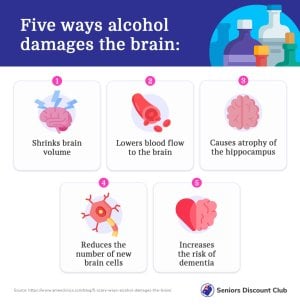This doctor quit drinking, and now he's urging everyone to do the same: Is there really NO safe alcohol consumption?
- Replies 11
At the SDC, we're always fascinated by new health discoveries that have the potential to improve our well-being and extend our lives. However, it's crucial to keep in mind that individual differences play a significant role in what's best for each person's health.
Take alcohol consumption, for example. We're all aware of the detrimental effects of excessive drinking on our health, but what if you only indulge in moderation? Could there be potential benefits, or are there still risks to be mindful of?
These are thought-provoking questions that prompt us to explore the nuances of alcohol's impact on our bodies.
Recently, we came across an intriguing perspective from Dr Daniel Amen, a renowned brain health specialist based abroad. Dr Amen's stance may surprise you, as he believes that alcohol should be eliminated entirely from our lives.
According to him, even what is considered 'moderate' alcohol consumption, which typically equates to two standard drinks per day for women and three for men, can still increase the risk of premature death and disrupt brain functions.

Dr Amen expresses scepticism towards studies that suggest moderate alcohol intake has health benefits, as he claims many of these studies were funded by the alcohol industry and may therefore have biased results.
The doctor also highlights a recent study that analysed 107 research papers spanning four decades and involving nearly five million participants.
In his opinion, this study revealed that any amount of alcohol consumption posed an elevated risk of early death with no discernible health benefits.
On the topic of brain health, Dr Amen points out that alcohol consumption can disrupt the development of white matter in the brain, which can be likened to the 'highways' of our cognitive function.
Dr Amen's perspective on our relationship with alcohol is indeed thought-provoking. He compares it to a psychological phenomenon known as 'Stockholm Syndrome', where individuals develop positive feelings towards those who have caused them harm.
From his point of view, alcohol can be likened to a captor that stalks and hurts us, yet we develop an attachment to it. He extends this perspective to marijuana as well, noting that while some people may be emotionally attached to it, it may not necessarily be beneficial for their health.
While health experts generally advise avoiding alcohol altogether, some studies have suggested that minimal alcohol consumption may have potential health benefits.
For instance, Harvard University has highlighted research indicating that alcohol consumption may reduce the risk of heart attacks, cardiovascular disease, gallstones, and type 2 diabetes.
However, it's important to note that these same health benefits can also be achieved through a healthy diet and regular exercise. This information underscores the significance of adopting a holistic approach to health, considering multiple factors that contribute to overall well-being.
It's always prudent to consult with healthcare professionals and make informed decisions about alcohol consumption based on individual health circumstances and factors.
Understanding that there are alternative ways to attain similar health benefits without alcohol reinforces the idea that moderation and balance are key when it comes to making choices about our health.

We came across some recent data from the Australian Bureau of Statistics (ABS) that has us a bit concerned.
Alcohol-induced deaths have reached their highest rate in a decade, and these deaths are largely caused by long-term drinking and are associated with serious conditions like late-stage liver disease, neurodegenerative diseases, and heart failure.
What's even more troubling is that one doctor has reported that a quarter of all intensive care resources in his hospital are now being utilised to treat critical illnesses directly linked to alcohol consumption.
In an interview with The Guardian Australia, the anonymous physician expressed alarm over the worst spike in cases of severe alcohol-related diseases he has witnessed at his hospital. He mentioned seeing jaundiced and confused individuals in their 40s and 50s dying from liver failure.
If you want to learn more about this concerning trend, you can check out the full report in the article linked here.
As we delve into the latest findings on alcohol-induced deaths and their detrimental impact on health, it's crucial to reflect on our own habits and choices when it comes to alcohol consumption.
Members, are you concerned about the increasing rates of alcohol-related deaths? Have you witnessed the negative effects of excessive drinking in your community or among your loved ones? What steps can we take to prioritise our health and well-being while enjoying alcohol responsibly, if at all?
We'd love to hear your thoughts and insights on this important topic - feel free to leave a comment below!
Take alcohol consumption, for example. We're all aware of the detrimental effects of excessive drinking on our health, but what if you only indulge in moderation? Could there be potential benefits, or are there still risks to be mindful of?
These are thought-provoking questions that prompt us to explore the nuances of alcohol's impact on our bodies.
Recently, we came across an intriguing perspective from Dr Daniel Amen, a renowned brain health specialist based abroad. Dr Amen's stance may surprise you, as he believes that alcohol should be eliminated entirely from our lives.
According to him, even what is considered 'moderate' alcohol consumption, which typically equates to two standard drinks per day for women and three for men, can still increase the risk of premature death and disrupt brain functions.

A brain specialist warns that no amount of alcohol is safe to drink as it disrupts brain function and increases the risk of early death. Credit: Unsplash/Tony Flood.
Dr Amen expresses scepticism towards studies that suggest moderate alcohol intake has health benefits, as he claims many of these studies were funded by the alcohol industry and may therefore have biased results.
The doctor also highlights a recent study that analysed 107 research papers spanning four decades and involving nearly five million participants.
In his opinion, this study revealed that any amount of alcohol consumption posed an elevated risk of early death with no discernible health benefits.
On the topic of brain health, Dr Amen points out that alcohol consumption can disrupt the development of white matter in the brain, which can be likened to the 'highways' of our cognitive function.
Dr Amen's perspective on our relationship with alcohol is indeed thought-provoking. He compares it to a psychological phenomenon known as 'Stockholm Syndrome', where individuals develop positive feelings towards those who have caused them harm.
From his point of view, alcohol can be likened to a captor that stalks and hurts us, yet we develop an attachment to it. He extends this perspective to marijuana as well, noting that while some people may be emotionally attached to it, it may not necessarily be beneficial for their health.
While health experts generally advise avoiding alcohol altogether, some studies have suggested that minimal alcohol consumption may have potential health benefits.
For instance, Harvard University has highlighted research indicating that alcohol consumption may reduce the risk of heart attacks, cardiovascular disease, gallstones, and type 2 diabetes.
However, it's important to note that these same health benefits can also be achieved through a healthy diet and regular exercise. This information underscores the significance of adopting a holistic approach to health, considering multiple factors that contribute to overall well-being.
It's always prudent to consult with healthcare professionals and make informed decisions about alcohol consumption based on individual health circumstances and factors.
Understanding that there are alternative ways to attain similar health benefits without alcohol reinforces the idea that moderation and balance are key when it comes to making choices about our health.
Key Takeaways
- Dr Daniel Amen, a brain health specialist, suggests that alcohol should be eliminated entirely from our lives due to the potential risks and lack of health benefits, citing studies funded by the alcohol industry as potentially biased.
- He compares our relationship with alcohol to the psychological phenomenon of Stockholm Syndrome, where individuals develop positive feelings towards something that harms them.
We came across some recent data from the Australian Bureau of Statistics (ABS) that has us a bit concerned.
Alcohol-induced deaths have reached their highest rate in a decade, and these deaths are largely caused by long-term drinking and are associated with serious conditions like late-stage liver disease, neurodegenerative diseases, and heart failure.
What's even more troubling is that one doctor has reported that a quarter of all intensive care resources in his hospital are now being utilised to treat critical illnesses directly linked to alcohol consumption.
In an interview with The Guardian Australia, the anonymous physician expressed alarm over the worst spike in cases of severe alcohol-related diseases he has witnessed at his hospital. He mentioned seeing jaundiced and confused individuals in their 40s and 50s dying from liver failure.
If you want to learn more about this concerning trend, you can check out the full report in the article linked here.
As we delve into the latest findings on alcohol-induced deaths and their detrimental impact on health, it's crucial to reflect on our own habits and choices when it comes to alcohol consumption.
Members, are you concerned about the increasing rates of alcohol-related deaths? Have you witnessed the negative effects of excessive drinking in your community or among your loved ones? What steps can we take to prioritise our health and well-being while enjoying alcohol responsibly, if at all?
We'd love to hear your thoughts and insights on this important topic - feel free to leave a comment below!








